 Petzlover
PetzloverOriental Bicolour is originated from United States but Sumxu is originated from China. Both Oriental Bicolour and Sumxu are having almost same weight. Both Oriental Bicolour and Sumxu has same life span. Both Oriental Bicolour and Sumxu has same litter size. Both Oriental Bicolour and Sumxu requires Low Maintenance.
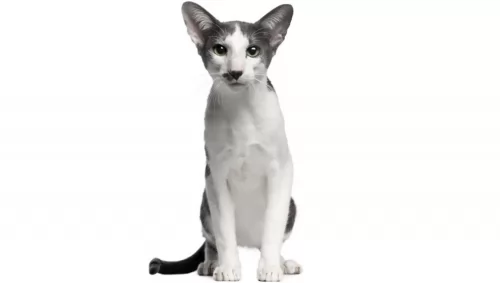 Oriental Bicolour cats owe their origins to Lindajean Grillo of Ciara Cattery. The cats hail from the United States. It was in 1979 that Grillo paired a Siamese and bicolored American Shorthair, selecting the best bicolored offspring to mate again with Siamese or Orientals.
Oriental Bicolour cats owe their origins to Lindajean Grillo of Ciara Cattery. The cats hail from the United States. It was in 1979 that Grillo paired a Siamese and bicolored American Shorthair, selecting the best bicolored offspring to mate again with Siamese or Orientals.
This particular variety was granted recognition in 1983 by TICA. It was during the 1980s that European breeders started their own Oriental bicolor breeding lines. The first modern Oriental Bicolours were imported to the UK during 2004.
The Sumxu is an odd-looking cat with its droopy ears or drop-ears. The truth is, the cat is considered extinct and the last reported Chinese lop-eared cat was way back in 1938.
According to reports, the cat seems to have first made an appearance in 1656 and was always described as a curiosity. It seems as if they were valued as pets but they were also used as food. A Polish man was the first Westerner to describe the Sumxu in his illustrated book Flora Sinensis. The breed was once found in and around Peking and resembled a long-haired Scottish Fold.
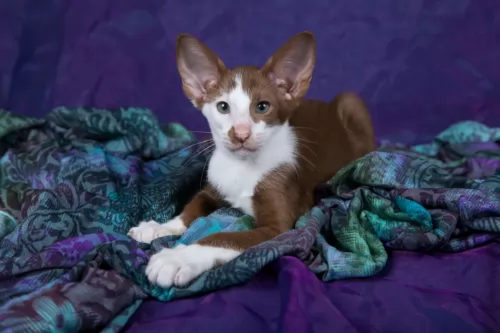 These cats with a triangular-shaped head and slender, long body have a fairly thin tail. The ears are widely set and are large. The eyes are green, but blue with the colorpoint varieties.
These cats with a triangular-shaped head and slender, long body have a fairly thin tail. The ears are widely set and are large. The eyes are green, but blue with the colorpoint varieties.
The coat is short, close-lying and sleek while the coat of the long-haired variety is fine and silky with no thick undercoat. The tail forms a plume. The coat is mostly white and the other part of the coat can be in any other color. You’ll always see quite a bit of white around the legs.
These cats are suited for singles, couples, families, and seniors - in fact, anyone still active enough to provide this cat with lots of attention.
These vibrant cats are known for their social, friendly and loving personality. They are intelligent, inquisitive, active cats that need to have plenty of interaction with their human family members. They love their human family and love to hold conversations with them.
They're entertaining too, and love nothing more to ve the center of attention. They're so into their human family that you may even have him waiting patiently for you to come home fro work. He shouldn't be left alone for hours on end and should rather have a pet friend to keep him company during the day.
The Chinese have always eaten this cat and because it has always been found in restrictive conditions the cat lost its keen sense of hearing because it no longer needed to hunt. The cat's ears lost their upright nature and became the hanging ears that are characteristic of the Chinese cat.
The cat had a long silky, shiny coat and was a dirty yellowy type of color. It had a ruff, a thick tail and blue, slanted eyes. It is thought that the size of the Sumxu was somewhat larger than the standard cat so he would have been a medium to large-sized cat, weighing in the region of 4 to 7kg. He was thick-set and muscular.
It is thought that this cat wasn’t particularly active and that it seems to only become really animated when offered food, preferring to lie beside a warm fire than to be found outside. We can only assume that it was a fairly quiet cat.
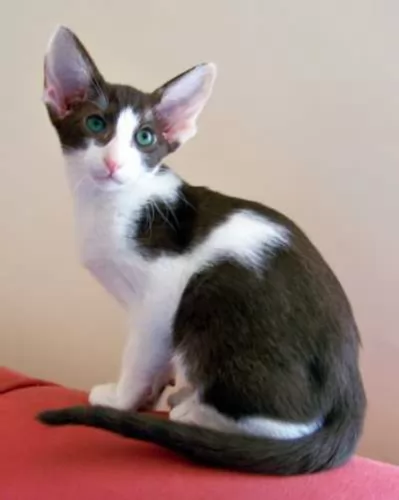 The Oriental Bicolor is such a wonderful pet to have. They are intelligent, entertaining, loving, active, playful, and inquisitive.
The Oriental Bicolor is such a wonderful pet to have. They are intelligent, entertaining, loving, active, playful, and inquisitive.
They’re also athletic and energetic. These cats have got all the characteristics you want in a good friend. They make a fantastic companion to people who are active and happy. They’re also very vocal and have a lot to say to their human family.
Not much is known of the character of the Sumxu cat as it is now extinct. It doesn't matter what kind of cat you have because every cat needs to be loved and well cared for. If you can't do that, then why get a cat in the first place.
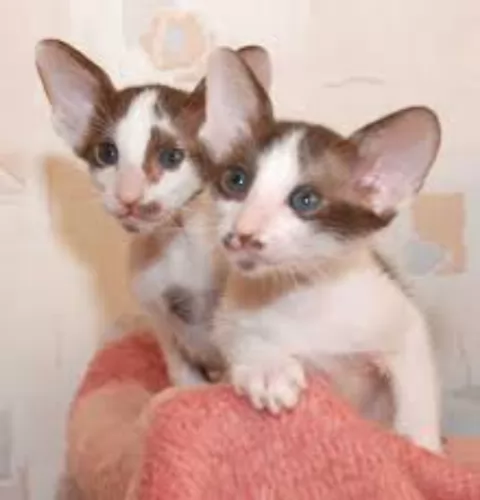 Any cat can develop health problems. Even kittens that come with a certificate of health can develop illnesses that you never thought possible.
Any cat can develop health problems. Even kittens that come with a certificate of health can develop illnesses that you never thought possible.
Orientals are generally healthy cats, but the health issues that may affect the Oriental are similar to that of the Siamese cat.
One of these is Progressive Retinal Atrophy (PRA). This is a genetic eye problem that can lead to blindness. Another disease to look out for is Asthma. The Siamese is susceptible to this disease which means your Oriental Bicolor will also be. You will have to get your furry friend to the vet who may precribe anti-inflammatory drugs.
The Sumxu cat should have seen the veterinarian every year for an examination and to make sure his vaccinations and deworming were up to date.
It is never a good idea to give your cat medication that hasn't been prescribed by the vet. If the Sumxu cat had ingested a poisonous substance, it would have been kind to call the vet. It would have been dangerous for the Chinese to eat such a cat that had ingested poison.
While cats should be spayed and neutered, it is quite possible that the Sumxu cat was eaten before it ever had a chance to become a parent. Neutering and spaying a cat has health benefits for the cat and can prevent cancers.
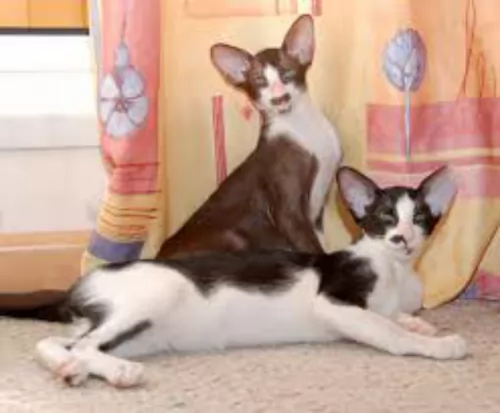 The Oriental Bicolor will require a brushing once a week. A good idea is to also take a warm, damp cloth and to wipe your cat down. It’s an excellent way to rid your cat of loose hairs as well as dust. The cat has a sparse coat, so brush him gently.
The Oriental Bicolor will require a brushing once a week. A good idea is to also take a warm, damp cloth and to wipe your cat down. It’s an excellent way to rid your cat of loose hairs as well as dust. The cat has a sparse coat, so brush him gently.
Other grooming requires nail clipping and checking inside his ears. If you clean his ears, be careful not to go deep into the ear. It is precisely why so many cat owners take their cat to the pet groomers where they can do these things professionally.
It’s very important to keep your Bicolor’s litter box spotlessly clean because like most cats, they won’t use their litterbox if it’s still got yesterday’s feces in it. It needs to be cleaned every day.
The Oriental’s diet is much like that of other cats – it has to be meaty. You can’t afford to not understand your feline pet’s dietary needs. Cats are carnivorous and they need commercial cat food that will be equal to fresh meat that they would normally find in the wild.
They need foods high in protein but they will still need some carbohydrates, amino acids, and vitamins, and minerals. Always go for the best quality pet cat foods because by buying the poorer quality ones you put your cat at risk of developing health problems. Never ever leave your cat without a constant supply of fresh, cool drinking water.
Supply your cat with all the things that make it a pleasure to have a cat. You don’t want to bring your pet home and only then start looking for things to make him at home. He’ll need food and water bowls, a nice warm, soft bed, a litter box, grooming accessories, collar, toys climbing tree and scratching pole.
Have your pet neutered or spayed to prevent unwanted kittens.
Make sure he is taken to the vet when ill. You shouldn't own a pet if you can't afford to pay vet fees. There are some cat illnesses that can make your cat very sick and uncomfortable. He should have his vaccines and also be treated for parasites.
One would have hoped that the now-extinct Sumxu cat received high-quality cat food. If you don't know what to feed your cat, your veterinarian will be able to advise you on the best diet. The cat food manufacturers always produce foods that take into account the cat's age and activity levels.
Certainly, every cat needs taurine, an essential amino acid, for heart and eye health. The food you choose for your cat should contain all the necessary vitamins and minerals.
You will need to provide fresh, cool water for your cat at all times. Wash and refill your cat’s water bowls regularly.
Take your pet to your vet for any signs of illness such as diarrhea, vomiting or lethargy.
The Sumxu cat would have required a brush every few days as the coat was long and silky. Brushing helps keep your cat's coat free of dust and loose hairs.
Your cat will need a litter box which should be placed in a quiet, accessible location. The Sumxu cat would not have liked feces in his litter box, and litter boxes of all cats should be kept clean.